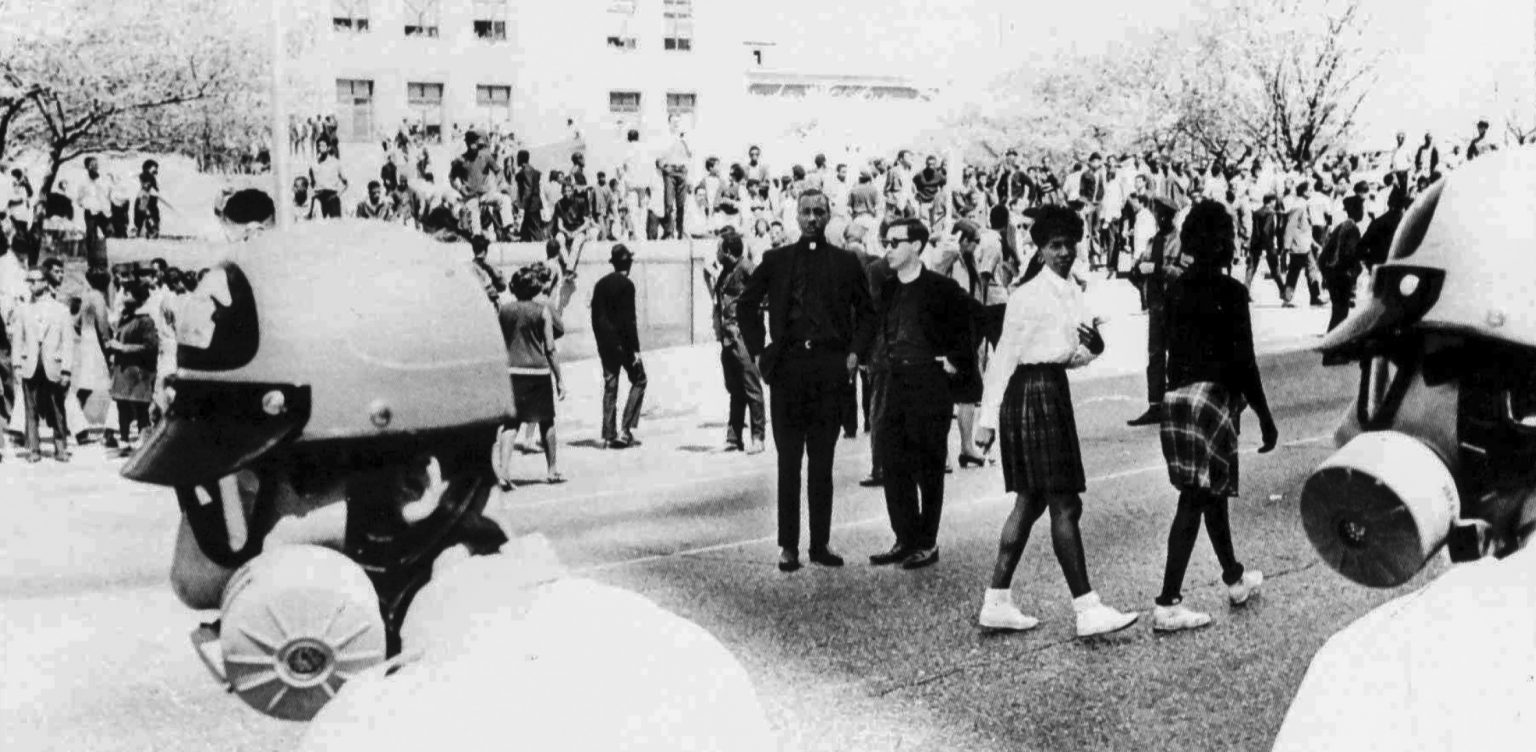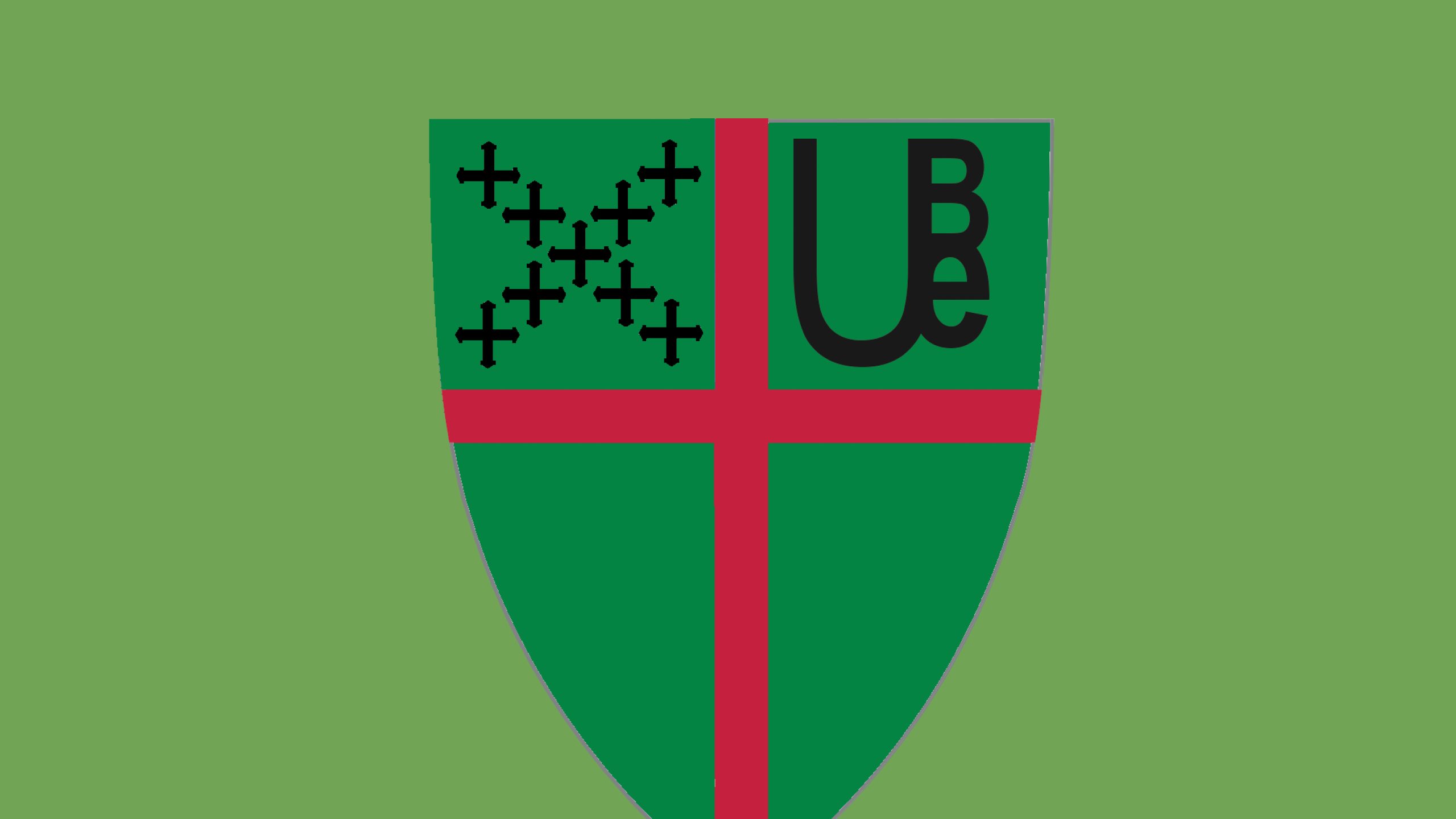
Center frame, left Fr. Edward Warner, right, Fr. David Fly.
Image credit: Kansas City Star, from the January 2006 issue of the Missouri Historical Review.
The History of the Rev. Canon Edward L. Warner
The Rev. Edward L Warner is a native of New Jersey. He was baptized and confirmed at St. Alban’s Episcopal Church, New Brunswick. He graduated from New Brunswick High School in 1957, received a BA degree from Rutgers University in 1961, and graduated from the General Theological Seminary in 1964. Upon ordination to the diaconate, he was assigned Vicar of St. Alban’s, New Brunswick, his home church. During his three years at St. Alban’s, he was a youth advisor in the Episcopal Diocese of New Jersey, a member of The Board of Directors of the Urban League of Greater New Brunswick, and appointed by the mayor to be the first chairman of the Human Relations Commission.
In 1968 Fr. Warner accepted the call to St. Augustine’s Episcopal Church, Kansas City, Missouri, serving as rector for nine years. He was instituted on February 11, 1968.
Fr. Warner was active on various committees of The Diocese of West Missouri and elected deputy to the 1976 General Convention. In Kansas City, he served as president of the Interdenominational Ministerial Alliance from 1970 –1974. He was Director of Urban Affairs, a member of the Steering Committee of the diocese, lectured on Black Religion at Rockhurst College, and participated in Kansas City Crisis, a program for Black-White dialogue.
In 1968, Fr. Warner was elected to a four-year term with the Kansas City Board of Education. During his tenure, he served on the Board with its President and good friend Charles J. Briscoe, Pastor of Paseo Baptist Church.
Fr. Warner was assisted by two dedicated and popular deacons, the Rev. Willard Smith Sr., and the Rev. Theodore Williams.
Fr. Warner was just 53 days into his ministry at St. Augustine’s when he was faced with a challenge that would result in physical injury, during what would come to be called the ‘Holy Week uprising.’
Dr. Martin Luther King was assassinated on April 4, 1968, and the nation witnessed violence and rioting in over 100 American cities. President Lyndon B. Johnson declared a National Day of Mourning for Dr. King to be held on April 7. On that day, three days before Palm Sunday, a crowd gathered at the City Hall. The police responded by throwing canister after canister of tear gas into the excited crowd. Students began running as the police in riot helmets and gas masks charged into the crowd with tear gas, mace, dogs, and clubs.
On Tuesday, April 9, Grace and Holy Trinity Cathedral was filled with people there to remember and mourn Dr. King. Present were leaders from all the Kansas City churches and denominations.
The Kansas City Missouri students had not been released from school on April 7, unlike those in the Kansas City, Kansas, Public School district. On April 9, the Kansas City, Missouri students were walking out of class. We were told that the students were protesting not being able to attend the funeral of Dr. King and were organizing a march to go downtown to protest to the mayor. The police had already thrown tear gas into groups of students and the anger and tension were growing. The National Association for the Advancement of Colored People (NAACP) believed that the clergy could help bring order into what was becoming a chaotic situation.
The clergy, including Frs. Warner and Fly headed to City Hall. A bottle was thrown at the Officers and several tear gas canisters were thrown at the crowd that ran in all directions to avoid exposure, Frs. Fly and Warner turned to run from the angry crowd. They had been standing together in front of a group of police officers. The officers knew they were clergy because their clerical collars were in full view. The crowd consisted of Police officers, students, onlookers, and clergy. An officer, wearing a gas mask frisked and searched Fr. Warner. Fr. Warner informed him that he was a priest of a church and that he and the officer were both on the same side. The officer responded by hitting him on his shoulder knocking him to the pavement with a Billy club. The Rev. Fly attempted to intervene, but the officer failed to listen to him nor help Fr. Warner from the ground. Fr. Fly was also clubbed and gassed. Five good Samaritans shouting “Brother is down” arrived to assist Fly and Warner.
St. Augustine’s was holding a Requiem Mass that day, but Fr. Warner could not attend, and another priest took his place. On that evening John Clair a well-respected leader in the church announced to the congregation that a letter and petition proposed by Dorthey Johnson would be submitted to Kansas City Police Chief Clarence M. Kelly and the Mayor, Ilus Davis concerning the deplorable and outrageous police treatment of Fr. Warner. The Congregation signed the petition that evening. Around that time, a group of women in the suburban Episcopal Churches proposed greater dialogue with St. Augustine’s, and offered personal protection and a possible refuge for Fr. Warner for his own personal safety against future potential threats. St. Augustine’s Episcopal Church Women, Judy Walker, Inez Kaiser, Evelyn Dillon, and other women congregants established productive dialogue with this group and supported their effort.
The Interdenominational Ministerial Alliance (IMA) of which Fr. Warner had been President, and the Baptist Ministers Union collaborated on other outstanding police misconduct issues that affected the community, continuing to work on improving police-community relations and dialogue.
Fr. Warner faithfully and diligently served St. Augustine’s and the community until 1976 when he relocated to Atlanta, Georgia.
In 1977, Fr. Warner was instituted Rector of St. Paul’s Episcopal Church in Atlanta, and he remained in that office until he retired in 2001. It was a period of major expansion for the church. He served on several committees and commissions of the Episcopal Diocese of Atlanta including the Standing Committee. He was thrice a deputy to the General Convention.
After retirement, Fr. Warner served as a supply priest at various churches in the diocese. He began supplying for the Diocese of the Eastern United States (Anglican Province of America) in Douglasville in 2003. He served as Vicar of Christ the King for ten years. In 2014 the bishop made him an honorary canon of St. Alban’s Anglican Cathedral, Florida.
This article was submitted by the Rev. Canon Edward L. Warner Chapter President, CJ Duffie. The history of the Rev. Canon Edward L. Warner was written by Brett D. Kynard member of St Augustine’s Episcopal Church and a former acolyte, serving under the Rev. Cannon Edward L. Warner 1968-1970.


